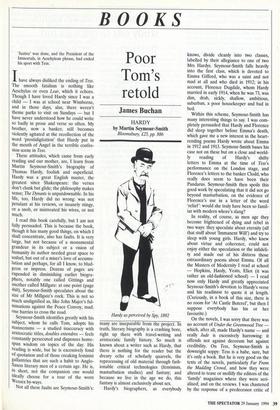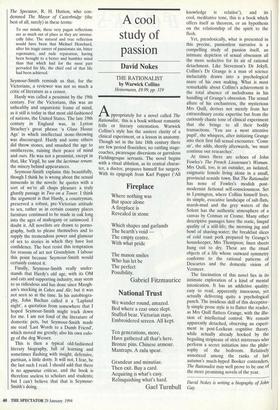BOOKS
Poor Tom's retold
James Buchan
HARDY
by Martin Seymour-Smith Bloomsbury, £25, pp. 886 by Martin Seymour-Smith Bloomsbury, £25, pp. 886
'Justice' was done, and the President of the Immortals, in Aeschylean phrase, had ended his sport with Tess.
Ihave always disliked the ending of Tess. The smooth fatalism is nothing like Aeschylus or even Lear, which it echoes.
Though I have loved Hardy since I was a child — I was at school near Wimborne,
and in those days, alas, there weren't theme parks to visit on Sundays — but I have never understood how he could write so badly in prose and verse so often. My brother, now a banker, still becomes violently agitated at the recollection of the
word 'prestidigitation' that Hardy put in the mouth of Angel in the terrible confes- sion scene in Tess.
These attitudes, which came from early reading and our mother, are, I learn from Martin Seymour-Smith's biography of Thomas Hardy, foolish and superficial. Hardy was a great English master, the greatest since Shakespeare: the verses don't clunk but glide; the philosophy makes sense; The Dynasts is unputdownable. In his life, too, Hardy did no wrong: was not petulant at his reviews, or insanely stingy, or a snob, or mistreated his wives, or not much.
I read this book carefully, but I am not fully persuaded. This is because the book, though it has many good things, on which I shall concentrate, also has faults. It is very large, but not because of a monumental grandeur in its subject or a vision of humanity its author needed great space to unfurl, but out of a miser's love of accumu- lation and perhaps, for all I know, to blud- geon or impress. Dozens of pages are expended in diminishing earlier biogra- phers, notably one called Gittings and another called Millgate: at one point (page 460), Seymour-Smith speculates about the size of Mr Millgate's cock. This is not so much undignified as, like John Major's ful- minations against the Peace Convoy, mad: one hurries to cross the road.
Seymour-Smith identifies greatly with his subject, whom he calls Tom, adopts his mannerisms — a studied inaccuracy with aristocratic titles, doubles entendres — feels constantly persecuted and dispenses home- spun wisdom on topics of the day. His reading is wide, but he is excessively fond of quotation and of those creaking feminist gallantries that are such a habit to Anglo- Saxon literary men of a certain age. He is, in short, not the companion one would ideally choose for a tour of the worn Wessex by-ways. Not all these faults are Seymour-Smith's: Hardy as perceived by Spy. 1892 many are inseparable from the project. In truth, literary biography is a crashing bore, right up there with travel-writing and aristocratic family history. So much is known about a writer such as Hardy, that there is nothing for the reader but the dreary echo of scholarly quarrels, the reprocessing of old material through fash- ionable critical technologies (feminism, masturbation studies) and fantasy; and because we live in the age we do, this fantasy is almost exclusively about sex.
Hardy's biographers, as everybody knows, divide cleanly into two classes, labelled by their allegiance to one of two Mrs Hardys. Seymour-Smith falls heavily into the first class, which is devoted to Emma Gifford, who was a saint and not mad at all and who died in 1912; in his account, Florence Dugdale, whom Hardy married in early 1914, when he was 73, was dim, drab, sickly, shallow, ambitious, suburban, a poor housekeeper and bad in bed.
Within this scheme, Seymour-Smith has many interesting things to say. I was com- pletely persuaded that Hardy and Florence did sleep together before Emma's death, which gave me a new interest in the heart- rending poems Hardy wrote about Emma in 1912 and 1913. Seymour-Smith bases his case not on these but on a close and world-
ly reading of Hardy's shifty letters to Emma at the time of Tess's performance on the London stage, and Florence's letters to the banker Clodd, who really does seem to have been their Pandarus. Seymour-Smith then spoils this good work by speculating that it did not go beyond masturbation, on the evidence of Florence's use in a letter of the word 'relief': would she truly have been so famil- iar with modern whore's slang?
In reality, of course, as men age they become frightened of dying and rebel in two ways: they speculate about eternity (all that stuff about 'Immanent Will') and try to sleep with young girls. Hardy, who knew about virtue and coherence, could not enjoy either the speculation or the infideli- ty and made out of his distress those extraordinary poems about Emma. Of all the Masters of Modernity I read at school — Hopkins, Hardy, Yeats, Eliot (it was rather an old-fashioned school) — I read now only Hardy and greatly appreciated Seymour-Smith's devotion to Hardy's verse
and his readiness to quote it at length. (Curiously, in a book of this size, there is no room for 'At Castle Boterel', but then I suppose everybody has his or her favourite.)
On the novels, I was sorry that there was no account of Under the Greenwood Tree -
which, after all, made Hardy's name — and
really Jude is excessively harrowing: it offends not against decorum but against credibility. On Tess, Seymour-Smith is
downright soppy: Tess is a babe, sure, but it's only a book. But he is very good on the
texts of the novels, particularly Far From the Madding Crowd, and how they were altered to tease or mollify the editors of the
'family' magazines where they were seri- alised; and on the reviews. I was chastened by the response of a predecessor critic of
The Spectator, R. H. Hutton, who con- demned The Mayor of Casterbridge (the best of all, surely) in these terms:
To our minds, these very pagan reflections are as much out of place as they are intrinsi- cally false. The natural and true reflection would have been that Michael Henchard, after his tragic career of passionate sin, bitter repentance, and rude reparation, having been brought to a better and humbler mind than that which had for the most part pervaded his life, the chief end of that life had been achieved.
Seymour-Smith reminds us that, for the Victorians, a reviewer was not so much a critic of literature as a censor.
Hardy was called a pessimist by the 19th century. For the Victorians, this was an unhealthy and unpatriotic frame of mind, as it still is today in that most old-fashioned of nations, the United States. The late 19th century in England was, in Lytton Strachey's great phrase 'a Glass House Age' in which intellectual stone-throwing was discouraged. Hardy and some others did throw stones, and smashed the age to smithereens, ruining their peace of mind and ours. He was not a pessimist, except in that, like Virgil, he saw the lacrimae rerum: the misery behind appearances.
Seymour-Smith explains this beautifully, though I think he is wrong about the sexual innuendo in the novels: he quotes with a sort of we're all chaps pleasure a truly ghastly passage in Two on a Tower. I think the argument is that Hardy, a countryman, preserved a robust, pre-Victorian attitude to sex, rather as in certain country places furniture continued to be made in oak long into the ages of mahogany or satinwood. I doubt it. All novelists are drawn to porno- graphy, both to please themselves and to supply the tremendous power and glamour of sex to stories in which they have lost confidence. The best resist this temptation for reasons of art not Grundyism. I labour this point because Seymour-Smith would certainly contest it.
Finally, Seymour-Smith really under- stands that Hardy's old age, with its OM and cats and supporting industry, may seem to us ridiculous and has done since Maugh- am's mocking in Cakes and Ale; but it was not seen so at the time. In his autobiogra- phy, John Buchan called it a 'Lapland night', a quotation from somewhere that I
hoped Seymour-Smith might track down for me. I am not fond of the literature of domestic pets, but Seymour-Smith made me read 'Last Words to a Dumb Friend', which moved me greatly; also his own eulo- gy of the dog Wessex.
This is then a typical old-fashioned literary biography, full of learning and sometimes flashing with insight, defensive, partisan, a little dotty. It will not, I fear, be the last such I read. I should add that there
is no apparatus criticus, and the book is therefore useless to scholars and students; but I can't believe that that is Seymour- Smith's doing.



































































 Previous page
Previous page